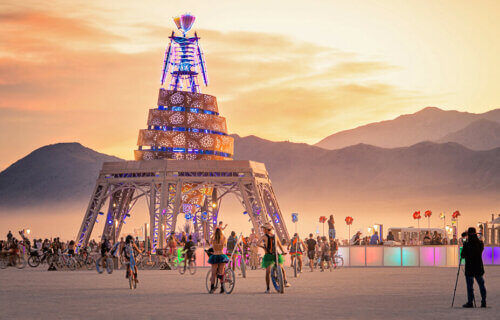
NEW HAVEN, Conn. — Some people go to festivals for music, others go on a journey of self-discovery. Researchers from Yale University report festival goers who attend mass gatherings such as Burning Man find themselves “transformed” by their experiences. People who felt transformed by the gathering reported feeling more connected to humanity and were more likely to help strangers.
“We’ve long known that festivals, pilgrimages, and ceremonies make people feel more bonded with their own group,” says Daniel Yudkin, a postdoctoral researcher and lead author of the study, in a university release. “Here we show that experiences at secular mass gatherings also have the potential to expand the boundaries of moral concern beyond one’s own group.”
The Yale researchers studied the behavior and experience of over 1,200 people attending festivals such as Burning Man, Burning Nest, Lightning in a Bottle, Dirty Bird, and Latitude. All of the festivals took place in the United States or the United Kingdom and emphasized art, music, and self-expression. The team set up booths at all the events, which they called “Play Games for Science.”
People who participated self-reported their experiences at the event and whether they were willing to share their resources with friends and strangers. For example, week-long festivals such as Burning Man do not sell food, and people who find themselves short must rely on the generosity of others.
The effect can last for months
Overall, 63.2 percent of people said they had a transformative experience and felt themselves changing. Among the 28 percent taking psychedelic drugs, the transformative experience felt even more intense. One of the takeaways from the transformative experience was feeling more connected to other humans, which made them more likely to share food and resources with other attendees.
After the festival, the researchers contacted the participants and 2,000 other people who attended the event but were not initially interviewed at the festival booth. They found people’s transformative experiences lasted for about six months.
“The findings are an important reminder of what we’ve missed in years of pandemic isolation,” Yudkin explains. “Powerful social experiences, or what the sociologist Emile Durkheim called ‘collective effervescence.’”
“Transformative experiences help people transcend the borders of the self and connect with all of humanity — crucial qualities to cultivate as we work to end this pandemic and prevent future ones,” adds study co-author M.J. Crockett, an associate professor of psychology at Yale.
The study is published in the journal Nature Communications.

